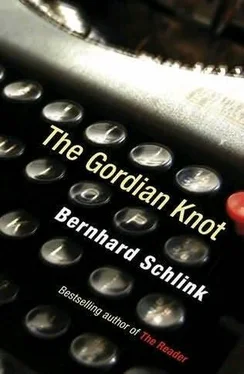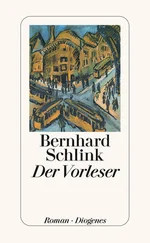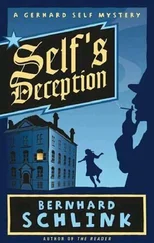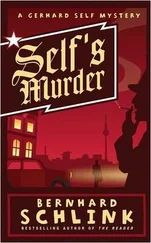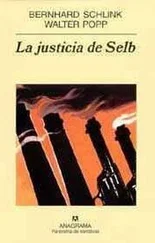His eyes had adjusted to the dim light. The distant voices he heard came from a tour group visiting the cathedral. The chairs in the row were battered, some with frayed wickerwork. The columns no longer melted into the darkness above, but were supporting a ribbed vault. No secrets-just bad lighting, gloomy corners, empty space, and distorted acoustics. But no secrets.
He got up and went back to the gift shop. He showed the cashier Françoise’s picture, an enlarged close-up of her reading on the bed. “Do you happen to know her?”
The young woman looked at him cautiously. “What do you want? Who are you?”
He had conjured up a romantic story: Françoise had visited Europe, their meeting in France, their love, a silly lover’s quarrel in which he had walked out in a huff, his not being able to find her. He looked the cashier in the eye and then lowered his gaze: such a foolish quarrel, his foolish pride, his foolish temper, he was ashamed of himself. Then he raised his eyes again with a sincere and determined look. “I’ve come to ask her to marry me.”
Since the cashier had not been working there very long, she took him to her boss, who had been the manager for ten years. The manager didn’t remember ever seeing Françoise either, but all that meant was that Françoise hadn’t worked there during the past ten years. Whether she had been a customer was another question-that, she couldn’t say. She herself wasn’t always on the floor, and she’d had many shop assistants over the years.
GEORG WAS NEVER SURE whether people were won over by his tale because they believed it, or because he was so sincere. Besides his romantic tale he also had one in which he was a young lawyer and Françoise an acquaintance of a client in France who didn’t know her full name or address. She was to be a key witness in a trial, the trial was vital for the client, and the client vital for Georg, who was an up-and-coming lawyer. What people liked about both tales was the role played by the picture of the cathedral, their cathedral. They looked at the photo carefully, gave the matter some thought, said they were sorry they couldn’t help him, and sometimes suggested where he might look further.
He spoke to current and former priests connected with the cathedral, with parishioners who had been volunteers, with the head of the Ladies Guild, the head of the theater workshop. Nobody recognized the face in the photograph. At times he felt her face becoming more unfamiliar to him every time he took out the picture and showed it. Was this the face that had smiled at him, that he had seen from so close, and touched and kissed? He felt that his growing unfamiliarity had to do with Françoise’s lowered eyes. But perhaps it would be even worse if her eyes had been visible. Maybe they, too, would wear away as he kept taking out the picture and showing it around. Usually the past lurks unnoticed behind the present, but Georg felt as if the past was being slowly sucked away under his helpless gaze.
In two weeks he had met over twenty people. He now knew the Upper West Side where most of them lived, and the subways and buses that took him to those who lived in other places. He knew the baroque, putto-decorated entrance of the Polish consulate, and the cold, white facade of the Soviet one. He often stood outside, or sat on a stoop across from the grand townhouse of the Poles or on the steps of the synagogue that the Russians eyed with grim faces. He didn’t know whether secret-service agents reported to their consulates, but a consulate offers a connection between its nation and the host nation, and Georg was seeking just such a relationship in the hope of finding out more about Françoise or even Bulnakov. He went inside both consulates and asked for Françoise Kramsky’s address, telling the staff he believed she had once either worked there or was somehow connected to the consulate. Both the Poles and the Russians told him they were not at liberty to provide that kind of information. He told them his tales in vain. He showed the officials her picture, but their faces betrayed no reaction.
He experienced Manhattan as a forest. This city isn’t on an island, he thought, it is an island. It isn’t part of a landscape, it is the landscape, a landscape of stone vegetation alien to its people, who must first hack paths through it and build dwellings that always risked being overwhelmed by the vegetation. Sometimes he came upon burned-out shells of buildings, lots heaped with rubble, facades with windows and doors that were empty or bricked up. It was as if they had been ravaged by war-but since there had been no war, it was as if nature had reclaimed them: not a rampant forest but a raging earthquake. The new buildings towered into the sky like growing crystals.
At night he had weird dreams. Many days he didn’t talk to a soul.
His money was running out. He only had a thousand dollars left, which wouldn’t last long in New York. The Epps gave him to understand, pleasantly but firmly, that it was time he moved on. He had gotten nowhere. Should he give up?
He sat in the Hungarian Pastry Shop, a café across from the cathedral. One could sit there as long as one liked. They served homemade cookies, and there were free coffee refills. The air was heavy with smoke. The paintings in the café were ugly, its mirrors dull; the paint was flaking off the walls and the column in the center of the room, beside which was a chest of drawers with a jug of coffee on top. The shop was a refuge for those who hadn’t yet made it or who no longer had any prospects of making it. Georg came here to relax and do some thinking. He exchanged a few words with people sitting at nearby tables, borrowed a newspaper, was asked for a light, or offered a cigarette.
Two men at the next table were talking about apartments and rents. One of them, Larry, was looking for a roommate. Georg told him he was looking for a place, and Larry said he had a room he could have for four hundred dollars. Larry taught German at Columbia, and liked the idea of having a German roommate. Within minutes everything was settled, and later that day Georg moved in.
He had the corner room of a twelfth-floor apartment, whose two windows looked out on different parts of the city. One faced a church tower, backyards, fire escapes, and rooftops, and had an uptown view of Broadway until the haze of the day swallowed the cars and houses, and the darkness of night swallowed their lights. His sleep was pierced by the howl of sirens, feverish spirals of sound that began and ended with a high-pitched gasp. From the other window he looked out onto a parking lot, low buildings, the trees of Riverside Park, and the Hudson River, lying wide and idle with its metallic sheen in the sun, and in bad weather melting into the opposite bank. From time to time a barge plowed its waters. The sun set between the wooden water towers on the roofs. The window facing west was larger, and the view from it wider. At times Georg felt as if he could spread out his arms and fling himself out over the parking lot, gliding over houses and trees and over the Hudson, and land like a large bird on the water. Why should he, who only had to spread out his arms in order to fly, give up his search?
Georg still hadn’t seen one of the former coordinators of the theater workshop or the former head of the Ladies Guild who was now running the kindergarten. He called and made appointments. Calvin Cope, the former director of the cathedral’s theater workshop, was now a real director, and initially said he was too busy to meet. It was a matter of life and death? he asked. Georg had crossed the Atlantic, come all the way from Europe? Well, in that case he’d meet him for lunch at a place on Fifty-second Street.
THE RESTAURANT SOUNDED EXPENSIVE, and Georg borrowed a jacket and tie from Larry, his roommate. The coat check and bar were at street level, and the maître d’ escorted Georg upstairs, where a table by the window had been reserved for Mr. Cope.
Читать дальше
